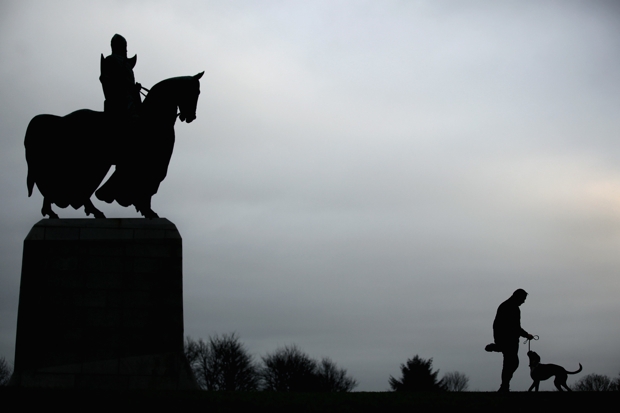Gordon Brown has spoken, and the unionist parties are in agreement: if there’s a ‘no’ vote then more powers will be given – we’re told – ‘to Scotland’. There’ll be another commission and another Scotland Act. This so-called Devo Max should have been offered six months ago; to offer it in the last few days of the campaign smacks of panic.
By moving more towards Salmond’s territory, the unionists conceded the premise: that more powers to the Edinburgh political elite is somehow the same as more powers to ‘Scotland’. And who could be against more power to Scotland? Not a single party, it seems, is questioning the premise: that the more the MSPs get up to, the better for Scotland. In this way, the separatists win the argument.
But power going to Edinburgh politicians is a very different thing than power going ‘to Scotland’. And I write with the zeal of the convert: I was, once, an ardent advocate of devolution and argued with room-emptying conviction that Scotland’s innate political genius was bound to create a parliament more advanced than Westminster. I agreed with Alex Salmond’s basic principle: decisions taken closer to home would be better decisions. I spent election night in 1997 with Danny Alexander, then a lowly LibDem activist, drinking whisky and Irn Bru (his idea) and toasting the new parliament. Pretty good compensation, I thought, for the ignominy of a Labour government. Scotland’s new parliament would embarrass London with its innovation and forward-thinking. And a new breed of politician! So when the Scottish Parliament was up and running I wangled my way to Edinburgh to report on it (for The Times).
I found, to my horror, that there was no new talent: all parties had just trawled the council chambers and found MSPs who were, as cohort, significantly thicker than the population at large. Rather than seek new ideas, they wanted to exhume old ones. Scottish Labour and the SNP were instead out to build a brand new East Germany, using their devolved powers to reject reform – and shield themselves from the future. Holyrood rejected Tony Blair’s City Academies, and his pioneering NHS reform – denying Scots the freedoms that would soon be transferred to English parents and patients.
I belatedly grasped the great lie about devolution: it doesn’t, actually, mean more power to a country. The power tends to be hoarded by its political elite, and not passed down to the people. So powers were not granted ‘to Scotland’ at all, but to a new bunch of MSP ministers who loved their new power as much as their new limos.
And here’s the irony: Scotland has had devolution for 15 years. But today, the English are the people with more power – and more independence. For example, thousands of parents have the power to choose types of state school, including independent schools (ie, Academies). Fee-paying schools in England have been closing, and re-opening as state schools – voluntary nationalization. There has been no ‘devolution’ to England, in constitutional terms. But there has been plenty of power devolved to England’s voters, thanks to the brave work of Andrew Adonis, Tony Blair, John Hutton and Michael Gove.
And those Scottish schools, after 15 years of Edinburgh rule? Let me quote Chris Deerin, whose Scottish Daily Mail column is the best thing not online:
For example, in 1999, only 5 per cent of pupils from Govan High went on to higher education. In 2010, the figure was 5.1 per cent. At Drumchapel High, the same statistic rose from 6 per cent to 9 per cent, and a pupil leaving the school was three times more likely to be unemployed than at university. Only 1 per cent of pupils at Drumchapel achieved five or more Highers in S5 in 2009, compared with 39 per cent at middle-class Jordanhill… The first response of Mike Russell, the SNP’s education minister, was to promise to force universities to take more kids from deprived backgrounds. Not, you will note, to give them a better education in the first place.
So if devolution is such a success, if granting power to Edinburgh politicians works so well for Scots, why are the kids entering Govan High being as shortchanged now as they were all those years ago? How has power-hoarding worked out for Scotland?
A few months ago, I went back to my old school, Nairn Academy – it now has its name written in Gaelic, for the benefit of its non-existent Gaelic pupils. That’s what identity-obsessed politics does for you. I saw brilliant teachers and bright pupils, but I was amazed to learn that it is categorised as a deprived school. I’d have loved to have gone back and seen that 15 years of devolution had transformed it into a place doing a lot better than its English counterparts. But as my colleague Alex Massie wrote about the latest PISA rankings:
‘the richest quarter of Scottish pupils performed at a level comparable with the average score in high-achieving Hong Kong but the poorest quartile’s results were on a par with low-achieving Turkey.’
‘while socio-economic status is as likely as in other countries to affect students, the effect it has is likely to be greater than in other countries.’
This is why I object to the word ‘independence’. Scots are already just as independent as the Welsh and English are – or a bit less independent, in fact, due to the way the state hoards power. The question on next week’s referendum is not about more power to the people, but the transfer of power from one political elite to another.
I’m a Highlander, Scottish, British and European – and proud to be all four. The wearying nationalist obsession with separation may succeed in robbing Scots of twin identities. But it will not make anyone in Scotland more independent. Only a devolution of power from the state to the people can do that.







Comments